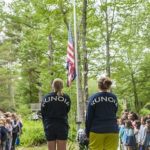Camp Directors in the “Off-Season:” Planning for Summer, Fostering Community
Summer youth camps across Maine are still. Buildings are closed, boats and docks are out of the water, and the exuberant sounds of children learning and playing have given way to the quiet of late fall. But while campers and counselors are immersed in their lives at school and work and home, camp directors are as busy as ever as they approach the end of the year and look ahead to the 2020 season. Summer may have ended, but for camp leadership, “off-season” may be something of a misnomer.
The work these days is certainly different for these professionals than it was at the height of summer. Just ask Alex Jackson, director of Camp Runoia, a girls’ camp in Belgrade.
The pace of the camp season would be unsustainable year-round, she admits. While the deskwork she is doing these days may not be as high-energy as the day-to-day life of camp in full swing, it is unquestionably essential for the successful operation of the organization. Camp directors have more flexibility – Jackson says she is itching for ski season to begin – and they don’t have the 24/7 responsibilities presented by the summer season, but their schedules are full, and plans are in motion.

“It’s nice to have reflective time in the fall,” says Jackson, who lives in the Sebago Lakes region when Camp Runoia is not in session. Matters can be evaluated “with a more critical, reflective eye, rather than in the thick of things” of the summer months.
“This time of year, we’re engaged in a different kind of way,” Jackson says.
That engagement includes re-enrolling campers, a task nearly complete at Camp Runoia. Active recruitment of new campers, a job made easier by the camp’s high camper retention rate, won’t begin until the new year, Jackson says. But staff recruitment is already underway.
The relative quiet of her work these days is beneficial, she says.
“It’s engaging in the way that you get the time and capacity to analytically look at what you’re doing.” That space for thoughtful consideration provides the opportunity to ask questions, Jackson says.
In addition, when camp has ended, and camp leaders come up for air, there is time for networking, Jackson says. Maine’s youth camp community is collaborative rather than competitive, directors often say, so when children and staff have departed, directors have time to share ideas, successes and challenges, and exchange suggestions.
All the while, summer 2020 – and beyond – are the driving force behind their efforts.
“I think it’s going to be a great season,” Jackson says. “Enrollment looks strong, and the economy is stable.”
Jackson says camps statewide share the challenge of hiring staff in a healthy job market and in competition with internships and young adults’ career pressures. “Everyone is in the same boat, looking to come up with creative solutions.”
At Wavus Camp for Girls, in Jefferson, re-enrollment of current campers has also wrapped up, says Director Kirstie Truluck. “For August through October, it’s all about our current families,” Truluck says. That includes identifying families she hasn’t heard from and sending emails and making phone calls.
“It’s not just sales,” she says. “These are people’s children.”
The commitment to those children, both veteran and prospective campers, can create hectic moments in mid-fall, Truluck says, as she reaches out to both groups of youngsters and their families.
And while the camp retention rate tops 80 percent, Truluck says she still invests significant time in following up on parent and camper feedback.
“It’s all about building relationships, all about communicating to parents: ‘We care about you, we know your kid,’” Truluck says.
As with many Maine youth camps, much of that communication is face-to-face, at parent and camper receptions across the country each fall. Truluck recently concluded a slate of about a dozen trips, visits with parents, staff, and current and future campers everywhere from Los Angeles to Palm Beach, Florida. Truluck also met with Wavus families – established and prospective – in Stamford, CT, New York, Baltimore, Washington, D.C., Philadelphia and Charlotte.
These gatherings at families’ homes provide an intimate chance to greet families, ask and answer questions, and simply catch up, she says. Truluck says the trips also provide the chance to visit with staff or alumni over a cup of coffee or share a meal with a potential funder.
“When people ask, I tell them it’s about recruitment, retention and community development,” she says.
The long-term health of an organization depends on “every little touch cumulatively,” Truluck says. Those contacts take place at receptions and coffee shops and dinners nationwide, Indeed, she says that while she was in Florida this fall, she drove six hours to see a young Wavus camper for twenty minutes. “She was someone who needed a touch,” she says. “She really just needed it.”
Truluck says she also spends time each fall supporting campers and staff by writing recommendations for college and work opportunities. Contact with staff members, she says, is ongoing as she communicates with young women considering all of their summer job opportunities and ponder their career goals and options.
Jeff Gleason, director of the YMCA Camp of Maine, says he also emphasizes community-building in his off-season work. Over a seven-week season, the camp hosts about 600 campers, half of whom are from Maine.

Amid off-season recruitment of campers and staff, plus planning for next summer, Gleason says “the big extra thing that happens is connection to families in community.”
“People have life events that occur – divorces, deaths, births. We are participating in those aspects of their lives.”
Creating and maintaining those connections with campers and staff is integral to his work, Gleason says.
Staff relationships are critical, he says. “We are helping them grow as young leaders. We definitely stay connected.” And the depth of those relationships extends beyond work at camp. From supporting families who’ve experienced a loss, to attending weddings, to writing recommendations, the camp’s contact doesn’t end on closing day.
“People know they can reach out to us,” Gleason says. “They’re comfortable.”

Like Camp Runoia’s Alex Jackson, Gleason says life between summers provides more flexibility, “a little more time for family.” That includes “that time to send kids off to school, time to go to events,” plus – like Jackson – some time to ski. Gleason is also involved with other YMCA community programs.
All the while, Gleason says he is “knee-deep” in hiring staff and recruiting campers. The number of returning staff members tends to “ebb and flow,” he says. “We do have a high percentage of staff that want to return this summer.” That means engaging in conversations about young adults “stepping up into new leadership positions,” he says.
“I think we’re in a good place this year.”
For Terri Mulks, director of Camp Susan Curtis in Stoneham, the focus in coming months will include the Susan L. Curtis Charitable Foundation’s fundraising efforts, culminating in a celebration dinner in March 2020; the camp’s upcoming American Camp Association accreditation visit; and organizing staff recruitment activities. For example, Mulks has recently met with personnel from Southern Maine Community College and St. Joseph’s College to discuss the placement of student interns at the camp.
Mulks says her 2019 staff was young, but “very good.” Forty-nine percent of the staff were former campers, a bit higher than average, and Mulks said there were enough staff members to place two counselors in each cabin; she is aiming for three per cabin in 2020.
Like many camps facing staffing challenges, “this year we are trying to figure out different ways for recruitment,” she says. That includes “getting started sooner rather than later.”
Plans for camper registration are also in the works, including communicating with school referral partners. Camp Susan Curtis, which operates four two-week sessions, offers camp opportunities, tuition-free, to economically disadvantaged Maine youth; Mulks works closely with school partners state-wide. Unlike some of her counterparts, however, Mulks will not undertake re-enrollment efforts until February and new camper registration until March.

This strategy, tailored to the population the camp serves, increases the chances of youngsters who are registered actually attending camp come summer, Mulks says. Registrations will ideally be completed by May, she says.
Mulks, the camp’s director for a decade, says last summer’s 73 percent camper return rate was the camp’s highest ever, topping the typical percentage in the “high 60s.”
“We want kids to come for multiple years,” she says. “It’s so nice when you know 73 percent of the kids coming in.”
Camp directors’ job descriptions are as varied as their year-round responsibilities. While summer is a sprint, the other seasons demand equal focus, energy and commitment – albeit at a different pace. Camp directors will ski this winter, to be certain, but foremost on their minds will still be the missions of the organizations they serve. Directors take opportunities to build and sustain connections, consider feedback and plan improvements, and collaborate with colleagues both informally and at conferences and other educational workshops. This essential work builds a critical foundation for continuing to create campers and staff’s positive and meaningful summer experiences. Those experiences, directors say, help launch children and young adults from summer success to success for a lifetime.